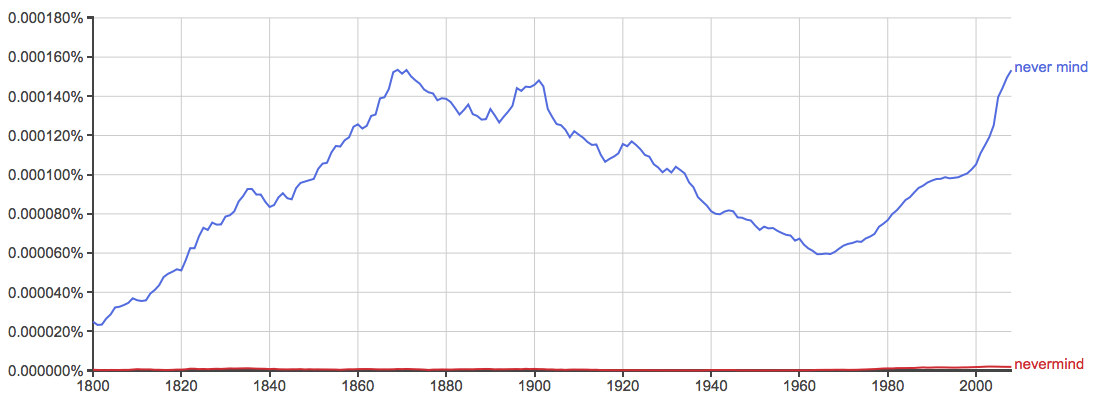Never mind (nevermind?) is a popular phrase in speech and writing, but there is some confusion on how the word ought to be written.
Is nevermind one word or should it be spelled never mind?
What is the Difference Between Nevermind and Never Mind?
Aside from the obvious space, is there any difference between these two words? And which one is correct to use?
In this post, I want to outline the current landscape of these spellings and advise the writer on how to proceed. After reading this post, you shouldn’t ever again wonder, “Is it nevermind or never mind?”
When to Use Nevermind
 A humorous way to describe the difference between nevermind and never mind is that nevermind is a Nirvana album, and never mind is the phrase you are thinking of.
A humorous way to describe the difference between nevermind and never mind is that nevermind is a Nirvana album, and never mind is the phrase you are thinking of.
Yes, the popularity of the one-word nevermind could have been enhanced by the American rock band’s 1991 album, but this spelling is still rarely seen in print. You can find occasional examples of it in newspapers, but it is rarely, if ever, used in book publication (see below).
Unless you are referring to a specific album or song title that uses nevermind as a single word, avoid the one-word spelling in your writing.
When to Use Never Mind
What does never mind mean? Never mind (two words) is the correct spelling of the phrase. Never mind is used to tell someone not to be concerned or worried.
- Never mind that commodity prices are plummeting all over the world and we are on the edge of a deflationary spiral. Why let reality get in the way of politics? –The New York Times
- Never mind that Erickson’s neighbor is Osweiler’s de facto boss. And never mind that Erickson’s neighbor, former Denver legend John Elway, was the man that ostensibly drafted Osweiler to someday replace another legendary Denver quarterback in Peyton Manning. –The Washington Post
This two-word spelling is the traditional spelling of the phrase, and it is used much more frequently than the one-word.

The above graph charts nevermind vs. never mind over the past 200 years of printed English books. The contrast is pretty stark.
Even if the use of nevermind were underestimated in the ngram by 10 times, never mind would still be 10 times as popular in writing. The preference is clear, and the traditional one-word spelling never mind predominates.
Trick to Remember the Difference
Here’s a good trick to remember never mind vs. nevermind.
When you’re writing never mind in your sentences, just think about what the word means and you will be all set.
- Never mind means don’t bother or don’t worry.
If you can associate never mind with other two-word phrases like don’t bother and don’t worry, you will be all set.
Summary
Is it never mind or nevermind? The correct phrase is spelled out into two separate words, and it is important that the writer use it accordingly, especially in formal writing.
Never mind is the correct spelling of the phrase.
Nevermind is a misspelling.
Contents
